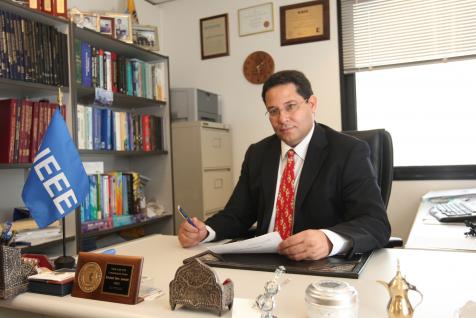A Chair Professor of Electronic and Computer Engineering at the Hong Kong University of Science and Technology has developed a ground breaking technology that will revolutionize the design of wireless communications networks, taking the world a step closer towards a truly global mobile community. For this major contribution, he and his research team were honored with the prestigious 2009 IEEE Marconi Award which was presented to the team in an Awards ceremony held on 15 June 2009 at the IEEE flag-ship conference, ICC’09, in Dresden, Germany.
Prof Khaled Ben Letaief’s ground breaking research is in the area of “wireless cooperative communications”. The objective is to turn disconnected neighboring wireless terminals into a cooperative system so that multiple transmission nodes can collaborate efficiently with each other in order to significantly extend the cellular transmission range while reducing the overall power consumption.
“Imagine all the wireless nodes and terminals within a geographic area cooperating with each other to perform like a super-network instead of stand alone one– this is what cooperative communication is all about. The improvements in the performance of all forms of mobile communications will be enormous, along with significant power saving,” Prof Ben Letaief said.
“A critical issue in cooperative networks is to ensure fairness. As resources of different networks are pooled together to maximize efficiency and improve performance, heavy users will stand to benefit from those who use less. Without fairness assurance, users will refuse to have their communication resources pooled, be it mobile handheld devices or wireless LANs,” explained Prof Ben Letaief, who is also the Head of the Electronic and Computer Engineering Department at HKUST.
Cooperative communications is a revolutionary technology that not only increases the system capacity and extend the range of service for a wireless system – e.g. enabling a doctor to have real time access to his patients’ vital signs that can be beamed to him thousands of miles away – but also has the potential of becoming one of the key environmental technologies in green radio networks where power savings is of critical importance, he added.
“The telecommunications industry’s power requirements have been increasing very rapidly. Green radio networks are emerging telecommunications systems whose aim is to achieve greater sustainability in our environment and produce energy-efficient communications networks,” Prof Ben Letaief explained.
The award winning paper was co-authored by Profs Wei Chen, Lin Dai, and Zhigang Cao. Prof Chen used to be Prof Ben Letaief’s PhD student and is now an Assistant Professor at Tsinghua University in Beijing. Prof Li Dai is a former Research Assistant of Prof Ben Letaief and is currently an Assistant Professor at the City University of Hong Kong. Prof Cao has jointly supervised Wei Chen.
For media enquiries, please feel free to contact :
Ross Lai
Tel: 2358 6306 / 9103 2928
Email: rosslai@ust.hk
Donna Wong
Tel: 2358 6317
Email: donnaw@ust.hk


